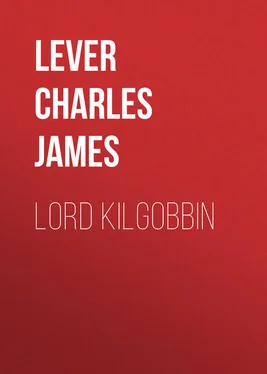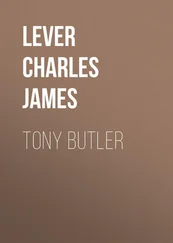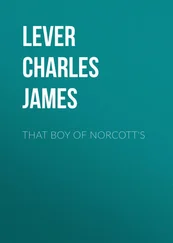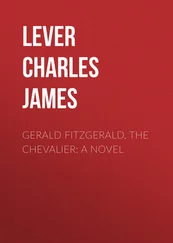Charles Lever - Lord Kilgobbin
Здесь есть возможность читать онлайн «Charles Lever - Lord Kilgobbin» — ознакомительный отрывок электронной книги совершенно бесплатно, а после прочтения отрывка купить полную версию. В некоторых случаях можно слушать аудио, скачать через торрент в формате fb2 и присутствует краткое содержание. Жанр: literature_19, foreign_antique, foreign_prose, на английском языке. Описание произведения, (предисловие) а так же отзывы посетителей доступны на портале библиотеки ЛибКат.
- Название:Lord Kilgobbin
- Автор:
- Жанр:
- Год:неизвестен
- ISBN:нет данных
- Рейтинг книги:3 / 5. Голосов: 1
-
Избранное:Добавить в избранное
- Отзывы:
-
Ваша оценка:
- 60
- 1
- 2
- 3
- 4
- 5
Lord Kilgobbin: краткое содержание, описание и аннотация
Предлагаем к чтению аннотацию, описание, краткое содержание или предисловие (зависит от того, что написал сам автор книги «Lord Kilgobbin»). Если вы не нашли необходимую информацию о книге — напишите в комментариях, мы постараемся отыскать её.
Lord Kilgobbin — читать онлайн ознакомительный отрывок
Ниже представлен текст книги, разбитый по страницам. Система сохранения места последней прочитанной страницы, позволяет с удобством читать онлайн бесплатно книгу «Lord Kilgobbin», без необходимости каждый раз заново искать на чём Вы остановились. Поставьте закладку, и сможете в любой момент перейти на страницу, на которой закончили чтение.
Интервал:
Закладка:
Now, Cecil Walpole never intended that this little Irish episode – and episode he determined it should be – should in any degree affect the serious fortunes of his life. He was engaged to his cousin, Lady Maude Bickerstaffe, and they would be married some day. Not that either was very impatient to exchange present comfort – and, on her side, affluence – for a marriage on small means, and no great prospects beyond that. They were not much in love. Walpole knew that the Lady Maude’s fortune was small, but the man who married her must ‘be taken care of,’ and by either side, for there were as many Tories as Whigs in the family, and Lady Maude knew that half-a-dozen years ago, she would certainly not have accepted Walpole; but that with every year her chances of a better parti were diminishing; and, worse than all this, each was well aware of the inducements by which the other was influenced. Nor did the knowledge in any way detract from their self-complacence or satisfaction with the match.
Lady Maude was to accompany her uncle to Ireland, and do the honours of his court, for he was a bachelor, and pleaded hard with his party on that score to be let off accepting the viceroyalty.
Lady Maude, however, had not yet arrived, and even if she had, how should she ever hear of an adventure in the Bog of Allen!
But was there to be an adventure? and, if so, what sort of adventure? Irishmen, Walpole had heard, had all the jealousy about their women that characterises savage races, and were ready to resent what, in civilised people, no one would dream of regarding as matter for umbrage. Well, then, it was only to be more cautious – more on one’s guard – besides the tact, too, which a knowledge of life should give —
‘Eh, what’s this? Why are you stopping here?’
This was addressed now to the driver, who had descended from his box, and was standing in advance of the horse.
‘Why don’t I drive on, is it?’ asked he, in a voice of despair. ‘Sure, there’s no road.’
‘And does it stop here?’ cried Walpole in horror, for he now perceived that the road really came to an abrupt ending in the midst of the bog.
‘Begorra, it’s just what it does. Ye see, your honour,’ added he, in a confidential tone, ‘it’s one of them tricks the English played us in the year of the famine. They got two millions of money to make roads in Ireland, but they were so afraid it would make us prosperous and richer than themselves, that they set about making roads that go nowhere. Sometimes to the top of a mountain, or down to the sea, where there was no harbour, and sometimes, like this one, into the heart of a bog.’
‘That was very spiteful and very mean, too,’ said Walpole.
‘Wasn’t it just mean, and nothing else! and it’s five miles we’ll have to go back now to the cross-roads. Begorra, your honour, it’s a good dhrink ye’ll have to give me for this day’s work.’
‘You forget, my friend, that but for your own confounded stupidity, I should have been at Kilgobbin Castle by this time.’
‘And ye’ll be there yet, with God’s help!’ said he, turning the horse’s head. ‘Bad luck to them for the road-making, and it’s a pity, after all, it goes nowhere, for it’s the nicest bit to travel in the whole country.’
‘Come now, jump up, old fellow, and make your beast step out. I don’t want to pass the night here.’
‘You wouldn’t have a dhrop of whisky with your honour?’
‘Of course not.’
‘Nor even brandy?’
‘No, not even brandy.’
‘Musha, I’m thinking you must be English,’ muttered he, half sulkily.
‘And if I were, is there any great harm in that?’
‘By coorse not; how could ye help it? I suppose we’d all of us be better if we could. Sit a bit more forward, your honour; the belly band does be lifting her, and as you’re doing nothing, just give her a welt of that stick in your hand, now and then, for I lost the lash off my whip, and I’ve nothing but this!’ And he displayed the short handle of what had once been a whip, with a thong of leather dangling at the end.
‘I must say I wasn’t aware that I was to have worked my passage,’ said Walpole, with something between drollery and irritation.
‘She doesn’t care for bating – stick her with the end of it. That’s the way. We’ll get on elegant now. I suppose you was never here before?’
‘No; and I think I can promise you I’ll not come again.’
‘I hope you will, then, and many a time too. This is the Bog of Allen you’re travelling now, and they tell there’s not the like of it in the three kingdoms.’
‘I trust there’s not!’
‘The English, they say, has no bogs. Nothing but coal.’
‘Quite true.’
‘Erin, ma bouchal you are! first gem of the say! that’s what Dan O’Connell always called you. Are you gettin’ tired with the stick?’
‘I’m tired of your wretched old beast, and your car, and yourself, too,’ said Walpole; ‘and if I were sure that was the castle yonder, I’d make my way straight to it on foot.’
‘And why wouldn’t you, if your honour liked it best? Why would ye be beholden to a car if you’d rather walk. Only mind the bog-holes: for there’s twenty feet of water in some of them, and the sides is so straight, you’ll never get out if you fall in.’
‘Drive on, then. I’ll remain where I am; but don’t bother me with your talk; and no more questioning.’
‘By coorse I won’t – why would I? Isn’t your honour a gentleman, and haven’t you a right to say what you plaze; and what am I but a poor boy, earning his bread. Just the way it is all through the world; some has everything they want and more besides, and others hasn’t a stitch to their backs, or maybe a pinch of tobacco to put in a pipe.’
This appeal was timed by seeing that Walpole had just lighted a fresh cigar, whose fragrant fumes were wafted across the speaker’s nose.
Firm to his determination to maintain silence, Walpole paid no attention to the speech, nor uttered a word of any kind; and as a light drizzling rain had now begun to fall, and obliged him to shelter himself under an umbrella, he was at length saved from his companion’s loquacity. Baffled, but not beaten, the old fellow began to sing, at first in a low, droning tone; but growing louder as the fire of patriotism warmed him, he shouted, to a very wild and somewhat irregular tune, a ballad, of which Walpole could not but hear the words occasionally, while the tramping of the fellow’s feet on the foot-board kept time to his song: —
‘‘Tis our fun they can’t forgive us,
Nor our wit so sharp and keen;
But there’s nothing that provokes them
Like our wearin’ of the green.
They thought Poverty would bate us,
But we’d sell our last “boneen”
And we’ll live on cowld paytatees,
All for wearin’ of the green.
Oh, the wearin’ of the green – the wearin’ of the green!
‘Tis the colour best becomes us
Is the wearin’ of the green!’
‘Here’s a cigar for you, old fellow, and stop that infernal chant.’
‘There’s only five verses more, and I’ll sing them for your honour before I light the baccy.’
‘If you do, then, you shall never light baccy of mine. Can’t you see that your confounded song is driving me mad?’
‘Faix, ye’re the first I ever see disliked music,’ muttered he, in a tone almost compassionate.
And now as Walpole raised the collar of his coat to defend his ears, and prepared, as well as he might, to resist the weather, he muttered, ‘And this is the beautiful land of scenery; and this the climate; and this the amusing and witty peasant we read of. I have half a mind to tell the world how it has been humbugged!’ And thus musing, he jogged on the weary road, nor raised his head till the heavy clash of an iron gate aroused him, and he saw that they were driving along an approach, with some clumps of pretty but young timber on either side.
Читать дальшеИнтервал:
Закладка:
Похожие книги на «Lord Kilgobbin»
Представляем Вашему вниманию похожие книги на «Lord Kilgobbin» списком для выбора. Мы отобрали схожую по названию и смыслу литературу в надежде предоставить читателям больше вариантов отыскать новые, интересные, ещё непрочитанные произведения.
Обсуждение, отзывы о книге «Lord Kilgobbin» и просто собственные мнения читателей. Оставьте ваши комментарии, напишите, что Вы думаете о произведении, его смысле или главных героях. Укажите что конкретно понравилось, а что нет, и почему Вы так считаете.












